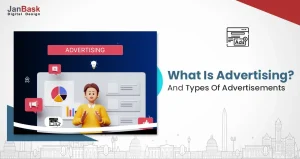
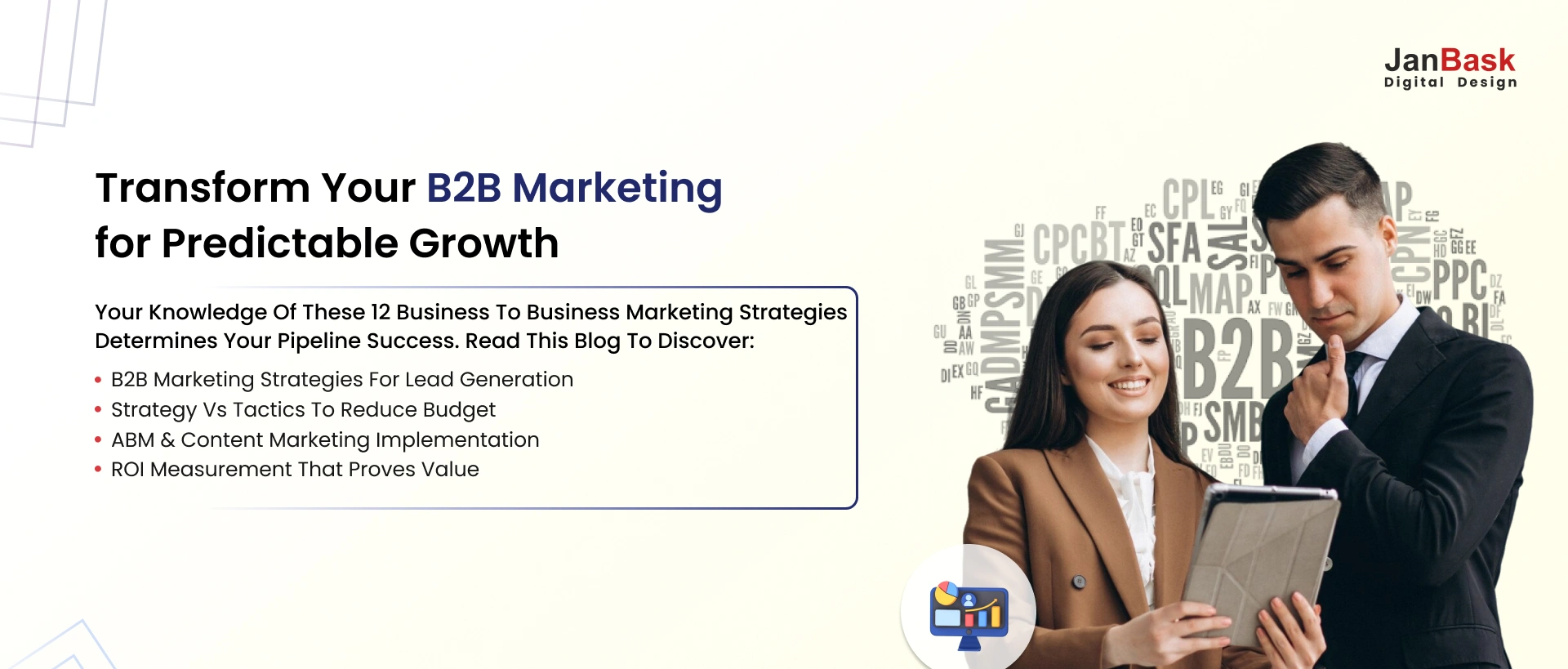
Why is it that some B2B companies consistently generate high-quality leads and close deals, while others invest in campaigns, content, and ads but see little impact on revenue?
The challenge isn’t a lack of effort. Most marketing teams are already producing valuable content, running multi-channel campaigns, and fine-tuning their funnels. Yet 61% of marketers struggle with lead generation, and sales teams still question lead quality.
Part of the problem is how buyers purchase today. According to Gartner, they spend just 17% of their buying journey talking to vendors, meaning most of their decision-making happens without your involvement. Add to that the 84% of buyers who expect personalized, relevant engagement, and it’s clear that generic marketing no longer works.
The companies seeing real results aren’t chasing trends; they’re executing proven strategies with precision, persistence, and a deep understanding of modern buyer behavior.
This guide reveals 12 powerful B2B marketing strategies that work in today’s competitive market and how you can adapt them to your industry, audience, and growth goals.
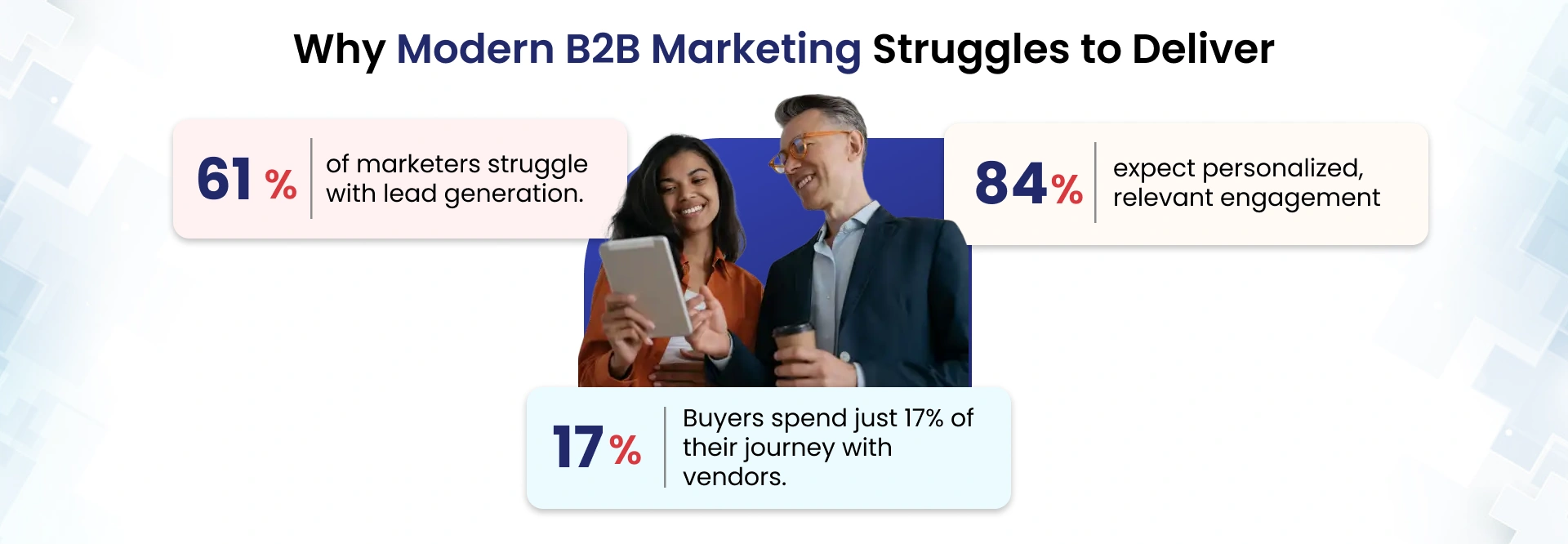
Every successful B2B marketing strategy needs a clear understanding of how prospects move from awareness to purchase. This journey is called the marketing funnel, and it's one of the most important frameworks for organizing your marketing efforts.
The traditional B2B marketing funnel has three core stages: Top of Funnel (awareness), Middle of Funnel (consideration), and Bottom of Funnel (decision). At each stage, prospects have different needs and consume different types of content.
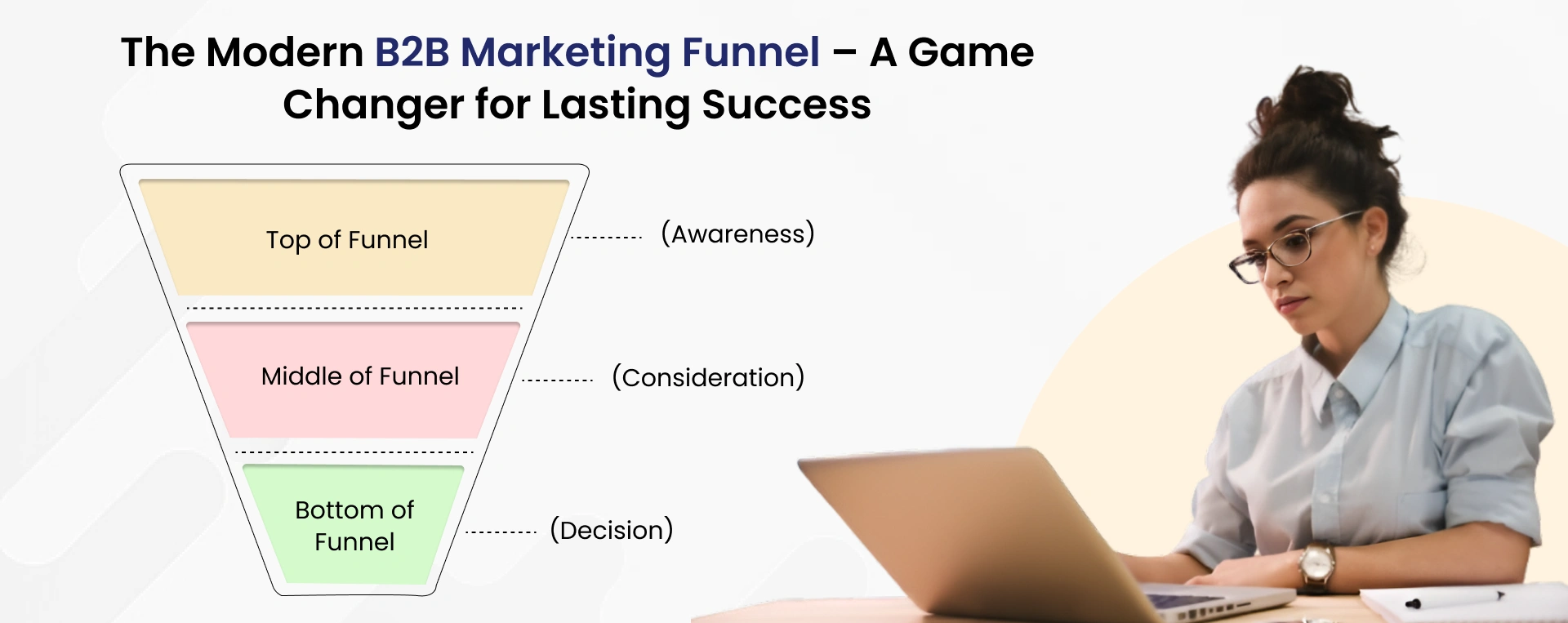
This is where potential buyers first realize they have a challenge, gap, or opportunity, but they may not fully understand the scope of it yet. Your goal here isn’t to sell, but to educate, inspire, and position your brand as a trusted source of insight. Content at this stage should answer questions, frame the problem clearly, and spark curiosity. Think industry reports that reveal emerging trends, blog posts that explain key challenges, podcasts with expert interviews, and social posts that highlight industry pain points. The objective is simple: get on their radar and earn their attention without pushing for a sale too soon.
By this stage, prospects know their problem and are actively exploring potential solutions. They’re evaluating different approaches, weighing the pros and cons, and narrowing their shortlist of vendors. This is your opportunity to differentiate and show why your solution is the best fit. Provide content that builds trust and positions you as the most credible option—comparison guides that outline strengths against competitors, in-depth case studies showing measurable results, product-focused webinars, and ROI analyses. Here, clarity and relevance matter most: help them connect the dots between their needs and your offering.
At the decision stage, prospects are close to making a purchase but need reassurance that they’re making the right choice. This is where you provide proof, confidence, and a smooth path to “yes.” Sales enablement tools become critical. Personalized product demos, hands-on trials, detailed proposals, customer testimonials, third-party reviews, and contract flexibility can all help seal the deal. Every interaction should reduce perceived risk and confirm value. The mission here is clear: remove final doubts and make it easy for them to choose you.
The funnel doesn’t end when the contract is signed; in many ways, that’s when the most valuable marketing work begins. Retention is about keeping existing customers engaged, satisfied, and eager to expand their relationship with you. In B2B, where lifetime value often dwarfs the value of a single deal, nurturing current clients can generate more revenue than chasing new ones. Strategies here include regular account check-ins, exclusive training or resources, loyalty incentives, and proactive support. Sharing success stories, performance reports, and strategic recommendations helps position your brand as an ongoing partner, not just a vendor. The goal is to turn satisfied customers into advocates who renew, upgrade, and refer others to your business.
It helps you create the right content for each stage of the buyer's journey. Without this structure, you might create brilliant content that reaches prospects at the wrong time, like offering product demos to people who don't even understand their problem yet.
Modern B2B buyers don't move through these stages linearly. They might jump from awareness directly to decision, or spend months in the consideration phase. But understanding these stages helps you prepare valuable content for wherever prospects engage with your brand.
The key insight: Your business-to-business marketing strategies should address all funnel stages simultaneously, ensuring you're helpful whether someone is just starting their research or ready to make a purchase decision.
B2B marketing has changed dramatically in recent years. Buyers are more informed, competition is tougher, and the old playbook of cold outreach and generic campaigns no longer delivers the same results. Many businesses are still stuck using outdated methods, which is why their efforts fall flat.
Before diving into specific strategies, let’s address the elephant in the room: what worked three years ago might now be sabotaging your results.
When discussing marketing strategies, it’s important to distinguish between approaches designed for businesses and those targeting individual consumers. Each follows a different logic, pace, and goal. In the following sections, we’ll break down B2B and B2C marketing to highlight how they differ.
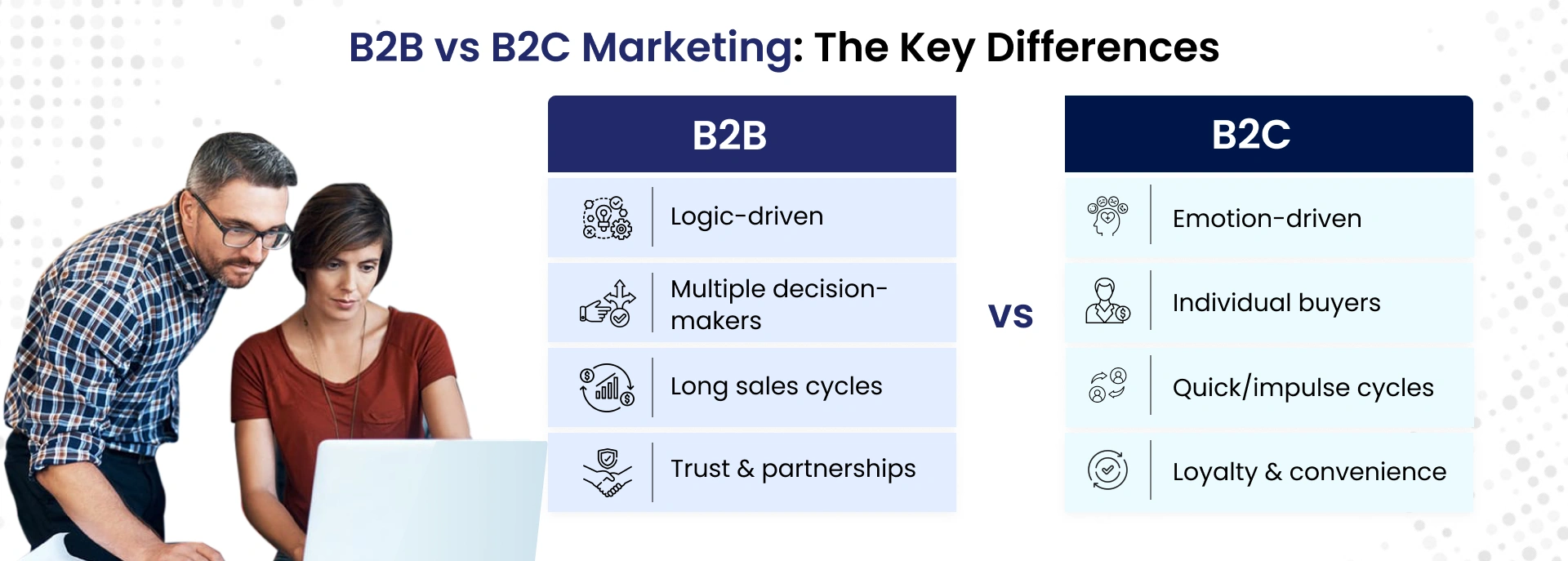
B2B marketing is logic-driven and process-focused. Buyers aren’t acting on impulse — they carefully evaluate ROI, consider team impact, and build consensus across multiple decision-makers. This makes the sales cycle longer and more complex, often requiring buy-in from several departments. Success depends on trust, credibility, and building long-term partnerships where you position yourself as a trusted advisor, not just a product seller.
B2C marketing is emotion-driven and often immediate. Individual buyers make quick or even impulsive decisions, influenced by desire, urgency, or emotional connection to a brand. Sales cycles are typically short, and the emphasis is on convenience, personalization, and brand loyalty. Here, creating strong emotional resonance and delivering seamless customer experiences is the key to repeat business and retention.
Today’s Modern B2B buyers don’t wait for sales reps to answer their questions. Long before they engage with your team, they research on their own by reading blogs, checking reviews, watching demos, and comparing competitors long before they reach out. By the time they contact you, they’ve already formed strong opinions about what they need and who can provide it. If your marketing isn’t showing up during this research stage with helpful content and clear answers, you risk being left out of the conversation entirely.
If you think marketing strategy and marketing tactics are basically the same thing, you're not alone. Most marketers use these terms interchangeably, and that confusion is costing them serious results.
Here's what typically happens: your boss asks for a "marketing strategy," and you respond with a list of activities: "We'll run LinkedIn ads, start a blog, send email campaigns, and attend trade shows." That's not a strategy. That's a tactic list disguised as strategy.
Your B2B marketing strategy is the big-picture roadmap. It defines who you’re targeting, what unique value you deliver, and how you want the market to perceive you.
Example: “We will position ourselves as the go-to cybersecurity partner for healthcare organizations struggling with compliance, offering unmatched expertise in HIPAA complexities.”
This provides clarity and direction. Now, every campaign, piece of content, and sales pitch aligns with a focused goal.
Marketing tactics are the specific actions you take to execute that strategy. They’re the “how” — the concrete steps and activities.
Example: LinkedIn articles on healthcare data breaches, case studies on HIPAA success stories, or webinars for healthcare IT directors.
Tactics are important, but they're meaningless without strategic direction.
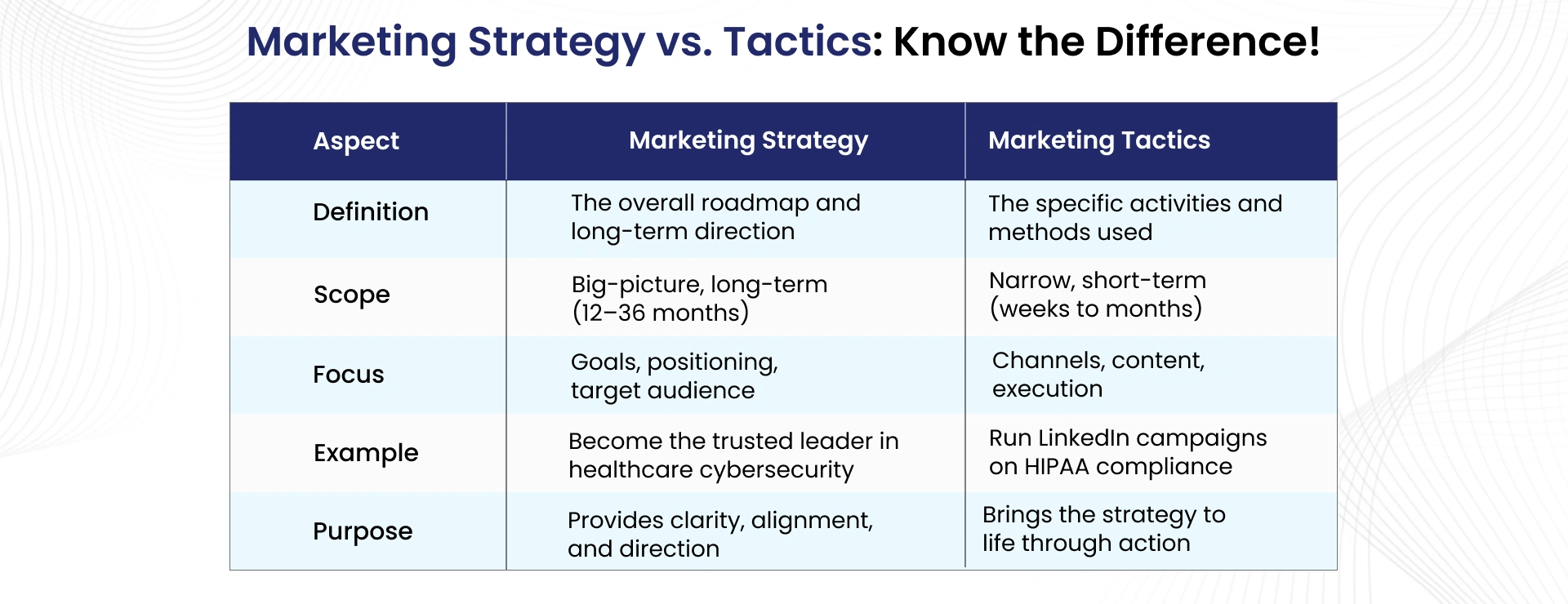
Here's why treating strategy and tactics as the same thing destroys your marketing effectiveness: without strategy, your tactics become random activities that confuse your message and waste resources.
You might create brilliant content that attracts the wrong audience. You could run perfectly optimized ads that generate leads your sales team can't convert. You end up busy but not productive.
Strategy provides the framework that makes every tactic exponentially more effective. When you know exactly who you're targeting and how you want to position yourself, every piece of content, every campaign, and every sales conversation becomes more focused and persuasive.
Behind every high-performing B2B marketing plan are four core elements that provide structure, clarity, and direction. When these components work together, they create a foundation for consistent growth, measurable impact, and long-term business success.

Your Ideal Customer Profile goes beyond basic demographics. Yes, you need to know company size and industry, but the real insight comes from understanding their specific pain points, decision-making process, and what success looks like for them personally.
Your Value Proposition articulates why someone should choose you over every other option, including doing nothing. This isn't about listing features, it's about connecting your capabilities to the specific outcomes your prospects desperately need.
Your Go-to-Market Approach determines how you'll reach and engage your ideal customers. This includes which channels you'll prioritize, how you'll allocate resources, and the sequence of touchpoints that guide prospects toward a purchase decision.
Finally, your Success Metrics define what victory looks like and how you'll measure progress. These aren't vanity metrics like website traffic or social followers; they're business metrics tied directly to revenue and growth.
Here's where the rubber meets the road. These aren't theoretical concepts or wishful thinking; these are the proven strategies that high-performing B2B companies use to generate predictable growth, even when their competitors are struggling.
Each strategy builds on the foundational elements we just covered, but they work best when integrated together rather than implemented in isolation.
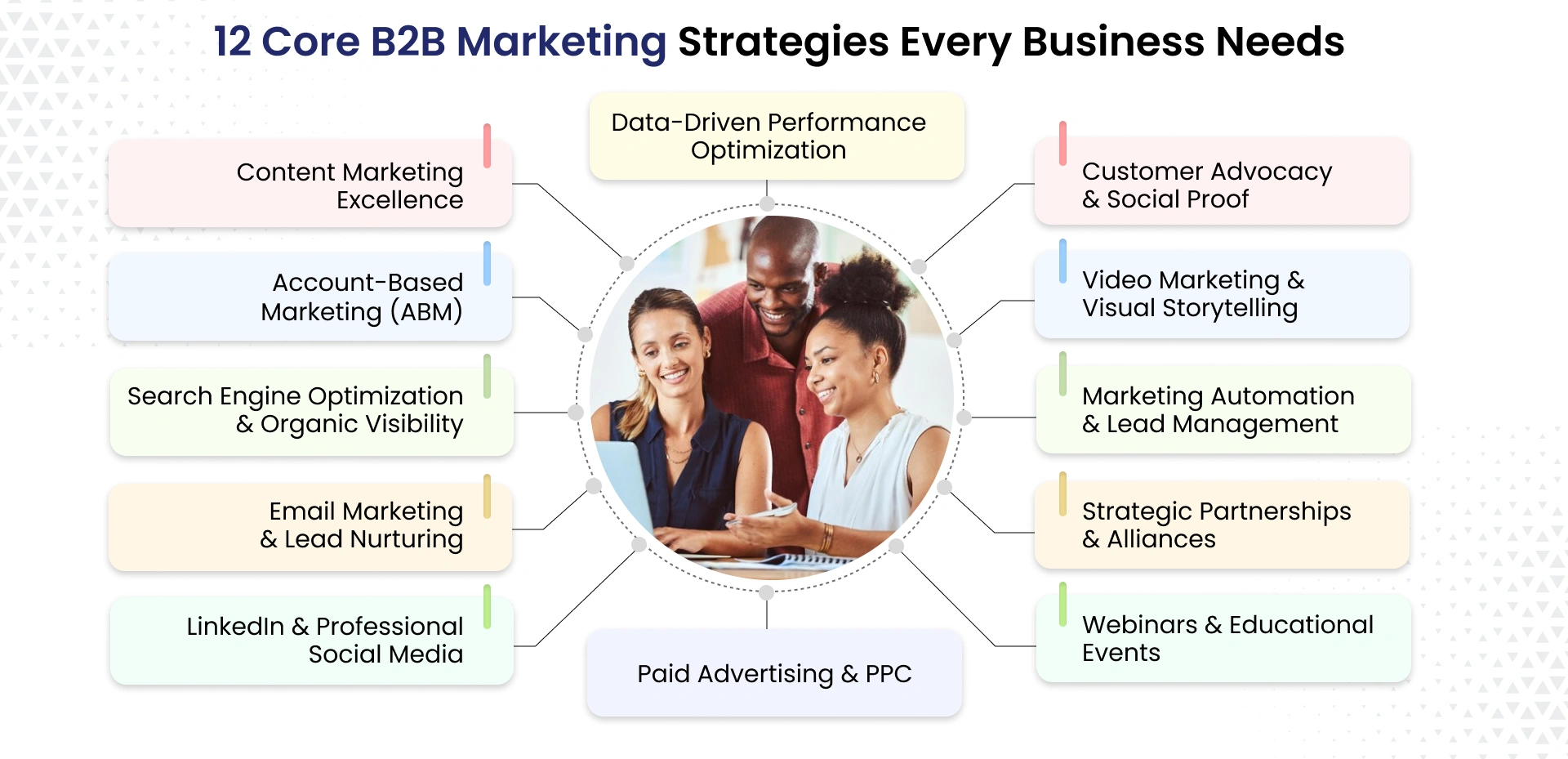
Content marketing isn't just about cranking out blog posts and hoping someone reads them. It's about positioning yourself as the go-to expert in your field while systematically moving prospects through their buying journey.

The companies winning with content understand that their prospects consume information differently at each stage of the decision-making process. Early-stage buyers need educational content that helps them understand their problems better. Mid-stage prospects want to see how different solutions compare. Late-stage buyers need proof that you can deliver on your promises.
Your content strategy should map directly to these stages:
The key is consistency and quality over quantity. Publishing one exceptional piece of content per week beats publishing five mediocre posts. Focus on topics where you have genuine expertise and unique insights.
Success comes from understanding that content marketing is a long-term investment. The companies seeing massive results today started building their content foundation two or three years ago.
Account-Based Marketing flips traditional marketing on its head. Instead of casting a wide net and hoping to catch good prospects, you identify your ideal accounts first, then create personalized campaigns specifically for them.
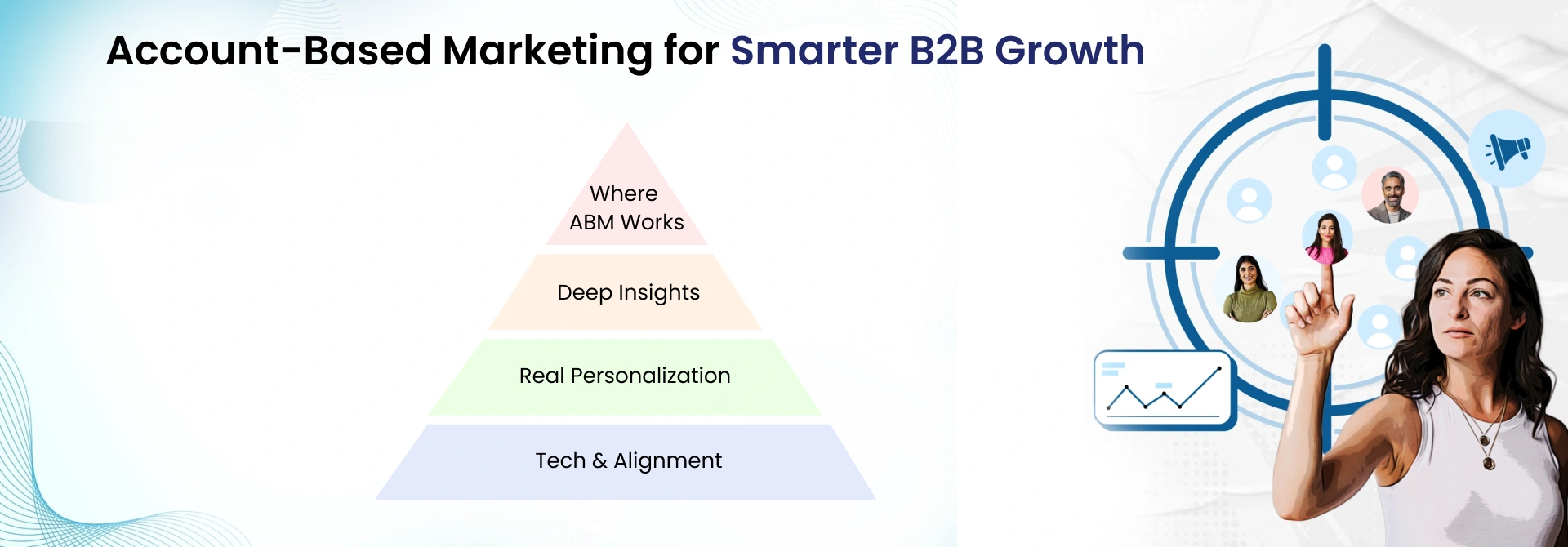
This approach makes sense when you're targeting large enterprise accounts with complex decision-making processes. Rather than trying to generate thousands of leads, you focus your resources on the 50 or 100 accounts that could transform your business.
ABM starts with deep research to gather critical insights about each account before crafting personalized strategies. You need to understand each target account's:
Personalization is crucial, but it goes beyond adding someone's name to an email. Real ABM personalization means creating content that addresses the specific challenges facing that company, in that industry, at that moment in time.
The technology stack matters here. You need tools that can track engagement across multiple stakeholders within each account, coordinate messaging across channels, and measure account-level progress rather than just individual lead metrics.
Success requires tight alignment between marketing and sales. Both teams need to agree on target accounts, messaging strategies, and handoff processes.
In B2B marketing, SEO is less about chasing traffic numbers and more about being visible at the exact moment your buyers are searching for solutions. Unlike paid ads that stop the moment you pause your budget, SEO builds long-term visibility and trust. It helps you attract decision-makers early in their research, shape their understanding of the problem, and position your business as the go-to solution provider. Done right, SEO doesn’t just drive clicks. It nurtures authority, credibility, and a steady pipeline of qualified leads.
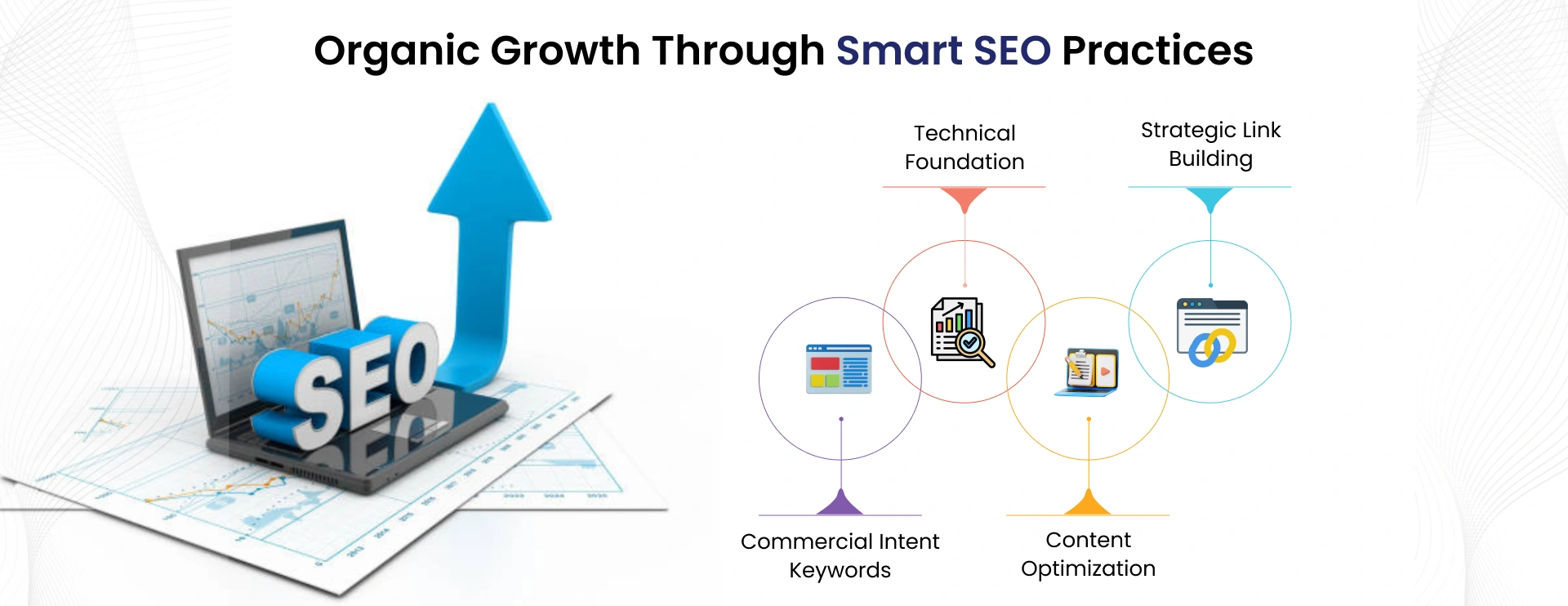
Your B2B website marketing strategy should focus on keywords that indicate commercial intent. Someone searching for "how to reduce customer churn in SaaS" is much more valuable than someone searching for "what is customer churn."
Technical SEO provides the foundation for strong organic visibility. To succeed, your site must be optimized for speed, structure, and accessibility. Your website needs to:
Content optimization comes next. Each page should target specific keywords while providing genuine value to visitors. The days of keyword stuffing are long gone—search engines now reward content that comprehensively addresses user intent.
Link building remains important, but the approach differs for B2B companies. Focus on earning links from:
Rather than pursuing generic high-authority links that don't relate to your market.
Email marketing in B2B isn't about sending promotional blasts to your entire database. It's about delivering the right message to the right person at the right time in their buying journey. Successful B2B email campaigns combine strategic segmentation, automated workflows, and personalized messaging to provide consistent value. By understanding your audience’s industry, role, and buying stage, you can create emails that educate, engage, and guide prospects toward meaningful decisions rather than just pushing promotions. For SaaS businesses, working with a specialized growth agency for SaaS ensures these workflows are optimized to nurture leads effectively and convert them into long-term customers.
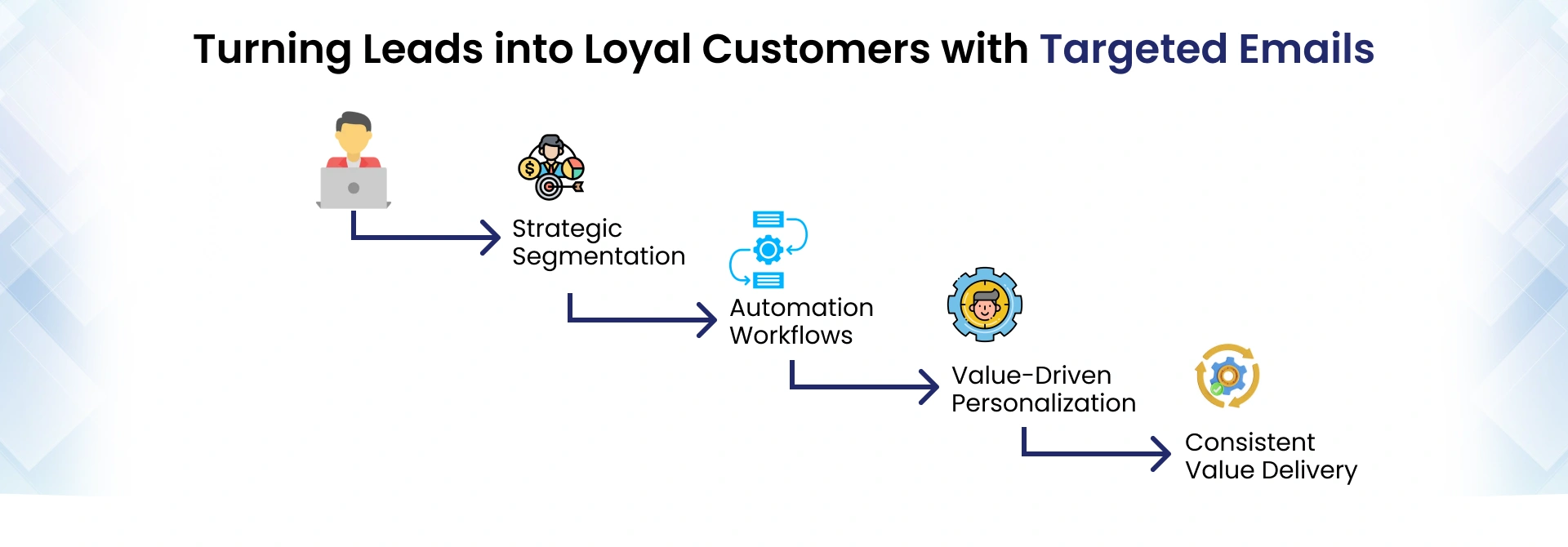
Segmentation is everything. Group your contacts based on key factors to ensure your messages are relevant and timely:
A CEO evaluating solutions needs different information than a technical manager implementing those solutions.
Automation workflows handle the heavy lifting. Set up sequences that trigger based on specific actions, such as downloading a whitepaper, visiting pricing pages, or engaging with sales content.
Personalization goes beyond using merge tags. Reference recent company news, industry challenges, or previous interactions. Show that you understand their business and current situation.
Value delivery must be consistent. Every email should provide something useful, insights, tools, exclusive content, or solutions to common problems. The moment your emails become purely promotional, engagement drops.
LinkedIn isn't just another social media platform for B2B companies; it's where your prospects spend their professional time, consume industry content, and make business connections. Using this platform effectively helps your brand stay visible, relevant, and trusted in your industry.

Your approach should blend personal and company presence. While your company page provides credibility and showcases your culture, individual executives and employees often drive more engagement and trust through their personal profiles.
In B2B social media, content strategy matters more than posting frequency. Instead of focusing on how often you post, aim to share valuable insights that educate, inform, and engage your audience. Share insights about:
Engagement drives visibility. Respond to comments on your posts, participate in relevant discussions, and share thoughtful commentary on others' content. The algorithm rewards genuine interaction over passive posting.
LinkedIn Sales Navigator isn’t just a prospecting tool; it’s a precision instrument for identifying key decision-makers, tracking their activity, and aligning outreach with your sales strategy. Pair this with employee advocacy, and you multiply your reach. When team members actively share company content or post about their experiences, it builds authenticity, humanizes your brand, and extends visibility into networks that company pages alone could never reach. Together, these tactics turn LinkedIn into a scalable pipeline builder.
Paid advertising accelerates your other marketing efforts when done strategically. The key is understanding that B2B buyers rarely convert immediately from ads; they use ads to discover solutions, then research extensively before making contact.
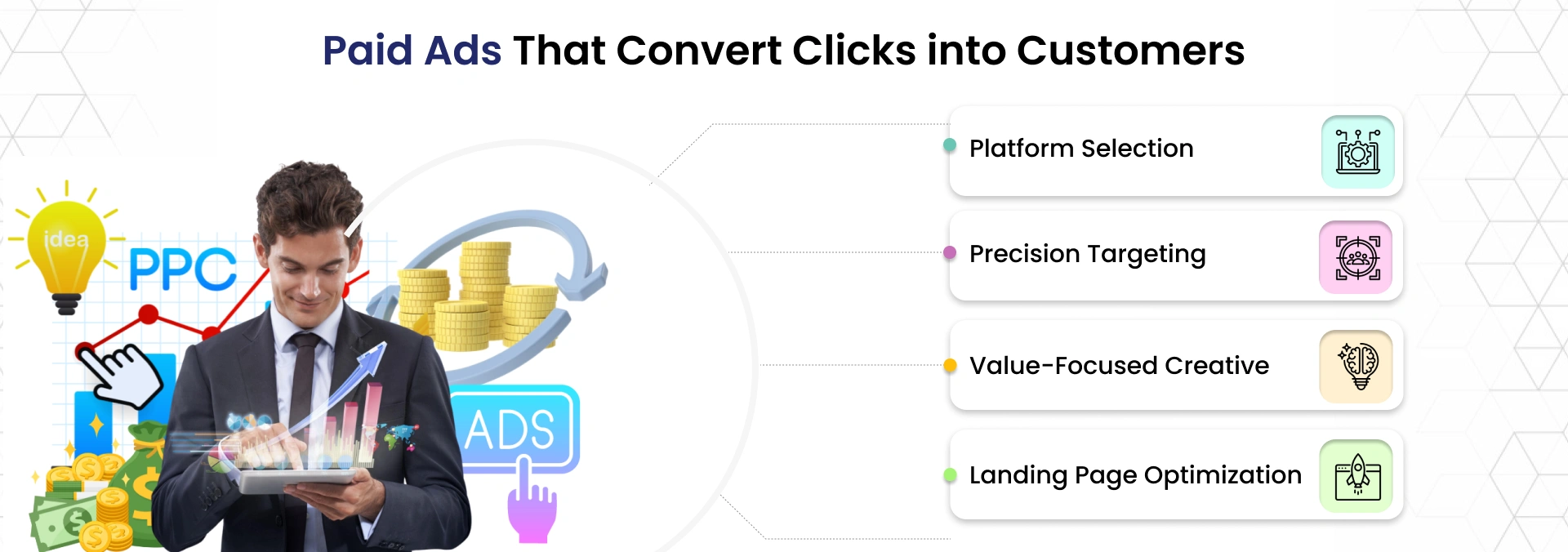
Platform selection depends on where your buyers spend time and how they prefer to engage with content. Choose channels that align with their behaviors and the type of message you want to deliver:
Audience targeting requires precision. Broad targeting wastes the budget on unqualified clicks. Use:
Ad creative should focus on value rather than features. Highlight specific outcomes, address common pain points, and use language that resonates with your target audience's daily challenges.
Landing page optimization determines conversion success. Every ad should direct traffic to a dedicated landing page that continues the conversation started in the ad. Generic homepages typically convert poorly.
Webinars remain one of the highest-converting lead generation tactics for B2B companies because they provide substantial value while positioning you as an expert in your field. By offering actionable insights, addressing audience pain points, and encouraging real-time interaction, webinars help build trust, nurture leads, and move prospects closer to making informed decisions.
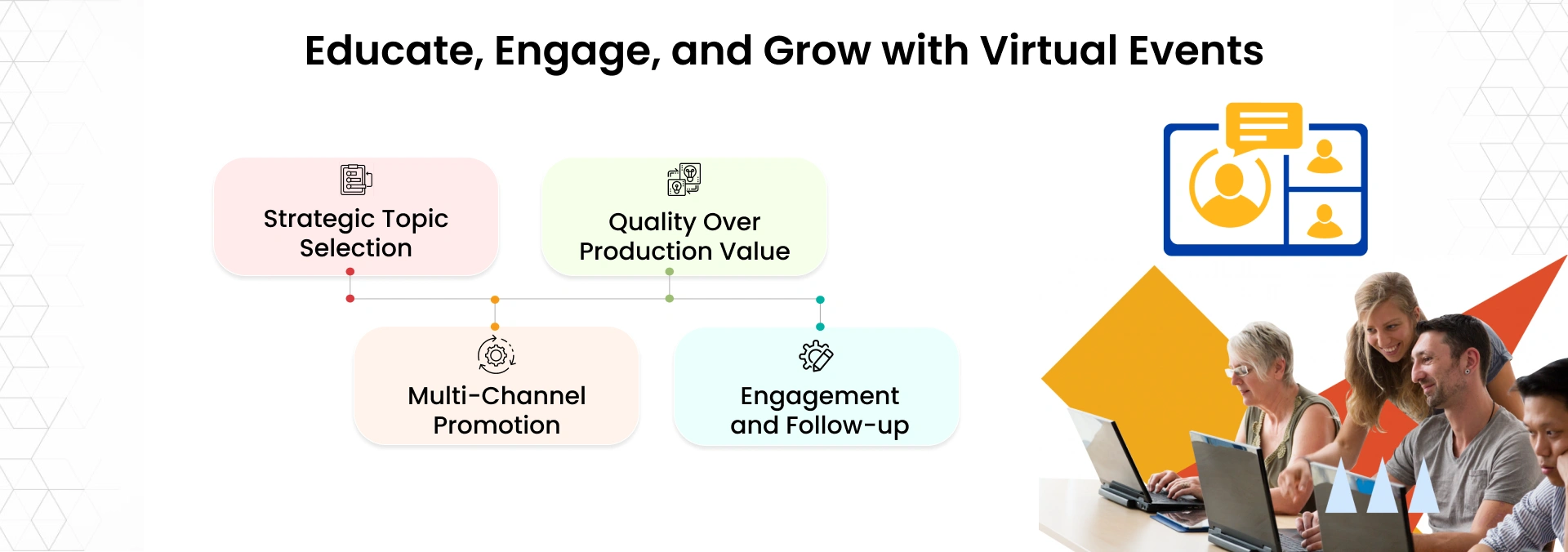
Topic selection determines attendance and quality. Choose subjects that address pressing business challenges your prospects face. Avoid product-focused topics in favor of educational content that helps attendees solve real problems.
Promotion strategy affects registration rates. Start promoting 3-4 weeks in advance across multiple channels:
Presentation quality matters more than production value. Focus on delivering content that truly helps your audience, providing:
Interaction keeps audiences engaged. Include polls, Q&A sessions, and chat discussions. Live interaction makes webinars feel personal and valuable rather than like pre-recorded pitches.
Follow-up processes convert attendees into prospects. Send presentation recordings, additional resources, and relevant case studies.
Strategic partnerships accelerate growth by leveraging other companies' relationships, expertise, and market presence. The right partnerships can open doors that would take years to unlock independently.

Partner identification starts with mapping your customer journey. Look for companies that serve the same customers at different stages or with complementary solutions.
Value creation must be mutual. Successful partnerships benefit both parties equally through:
Partnership types vary based on objectives and the value you aim to provide. Common approaches include:
Relationship management requires dedicated attention. Assign specific team members to nurture key partnerships. Regular communication, joint planning sessions, and collaborative goal-setting keep partnerships productive.
Marketing automation transforms how you scale personalized communication without proportionally increasing headcount. The right B2B internet marketing strategy includes automated workflows that nurture prospects systematically.

Platform selection depends on your specific needs and existing technology stack. Consider integration capabilities with your CRM, email marketing tools, and analytics platforms.
Lead scoring helps prioritize sales attention. Assign point values to different actions:
Workflow design should map to your buyer's journey. Create different sequences for different prospect types, industries, or company sizes. A startup founder needs different nurturing than an enterprise procurement manager.
Personalization capabilities make automation feel human. Use dynamic content to customize emails based on industry, company size, or previous interactions.
Video content engages B2B audiences more effectively than text-based content, but success requires a strategic approach rather than random video creation. Plan your video content around clear objectives, buyer personas, and key pain points. Combine storytelling with visuals and actionable insights to capture attention, educate viewers, and guide them along the buyer’s journey.

Content variety serves different purposes throughout the buyer's journey from awareness to consideration to decision and keep your audience engaged at every stage.:
Production quality matters less than content value. Smartphone videos with good lighting and clear audio often outperform expensive productions that lack substance.
Distribution strategy determines reach. Post videos on your website, share across social media platforms, include in email campaigns, and use in sales presentations.
SEO optimization helps videos get discovered. Include relevant keywords in titles and descriptions. Add closed captions for accessibility and search engine indexing.
Customer advocacy programs transform satisfied clients into powerful marketing assets. Prospective buyers trust peer recommendations more than any marketing message you could create. By showcasing real customer experiences, you build credibility, reinforce trust, and influence potential buyers throughout their decision-making journey.

Case study development requires a strategic approach. Focus on stories that resonate with your target audience's challenges and goals. Include:
Reference programs formalize customer advocacy. Identify your most satisfied customers and invite them to participate in:
Testimonial collection should be systematic. Request feedback immediately after successful project completion when satisfaction is highest. Ask specific questions that generate quotable responses about business outcomes.
Distribution across multiple channels maximizes impact. Feature customer stories on your website, include testimonials in sales presentations, and share success stories on social media.
B2B marketing success depends on measuring what matters and continuously optimizing based on data insights rather than assumptions or gut feelings. By establishing clear metrics, tracking performance, and acting on insights, you can refine campaigns, improve ROI, and make informed decisions that drive predictable growth.

KPI selection should align with business objectives. Track metrics that directly correlate with revenue growth:
Attribution modeling helps understand which activities drive results. B2B buyers typically interact with multiple touchpoints before converting. Multi-touch attribution provides a clearer picture of campaign effectiveness.
Reporting frameworks should serve different audiences and provide the right level of detail for each role. This ensures stakeholders can make informed decisions based on insights most relevant to them:
Testing methodologies ensure continuous improvement. A/B test email subject lines, landing page elements, and campaign messaging. Document results and apply learnings to future campaigns.
These B2B marketing best practices around measurement and optimization ensure your marketing investment generates predictable, scalable results rather than hoping for the best.
Many B2B marketers focus on the wrong metrics, such as website visits, email open rates, and social media followers, which offer limited insight into overall marketing effectiveness. To truly measure impact, companies prioritize business outcomes over activity metrics. Instead of asking 'How many leads did we generate?' They focus on questions like 'How many prospects are actively progressing through the buying journey?' and 'Which marketing efforts are directly contributing to pipeline growth and revenue?' This approach ensures marketing strategies are aligned with measurable business objectives and deliver tangible results.
Track key metrics that directly connect marketing activities to business outcomes:
Focus on metrics that reveal the depth and quality of your audience interactions, rather than just raw numbers:
First-touch attribution, multi-touch attribution, marketing influence on deals, and assisted conversions. These reveal how different strategies work together throughout the buyer's journey.
The most successful B2B marketers understand that their job isn't to generate leads, it's to generate customers. Every measurement decision should reflect that reality.
Building effective measurement systems means knowing which indicators predict success and which ones just create busy work.
Look for leading indicators like content consumption patterns, prospect research behavior, and engagement progression. These signal future buying intent before prospects are ready to talk to sales.
Including MQL-to-SQL rates, opportunity creation, proposal-to-close ratios, and win rates by source. These show where your funnel performs well and where it breaks down.
Through win/loss analysis, deal cycle comparisons, and market share indicators. These reveal whether your positioning strategies are working in real buying situations.
The key is knowing when to double down on what's working and when to pivot away from what isn't. Use data to guide your resource allocation, not to justify decisions you've already made.
Your B2B marketing success comes from executing proven B2B marketing strategies with a strategic focus rather than chasing every new tactic. The companies generating predictable growth understand the difference between strategy and tactics, and they measure what actually drives revenue.
You now have the framework to build a B2B marketing strategy that connects your activities directly to business outcomes. The path forward is clear: start with strategy, choose the right tactics for your situation, and measure what matters.
If you need expert guidance tailored to your specific goals, JanBask Digital Design has helped numerous B2B companies transform scattered marketing activities into strategic growth engines that deliver measurable results.
Your prospects are researching solutions right now. Make sure they find you first.
Drive Leads & Sales with 12 B2B Growth Methods!

T
B2B Marketing is itself too broad, this is one of the best blogs I found helpful in learning more about it.
P
I am going to start a business, looking for a post that can help me with marketing strategy, trust me, this is one of the best.
J
For my bakery shop we are following social media marketing strategies and using Facebook business pages, but not getting the desired response, not getting what to do. Pls suggest
E
Being new to this digital world of the internet, snuggling to learn different online marketing strategies for B2B/B2C. Can you help me with some well-recognized courses based on online marketing?
M
For all the marketing strategies mentioned in this post, I need a separate marketing team. What will be the average monthly expenditure, if you own marketing services from an external agency for marketing?